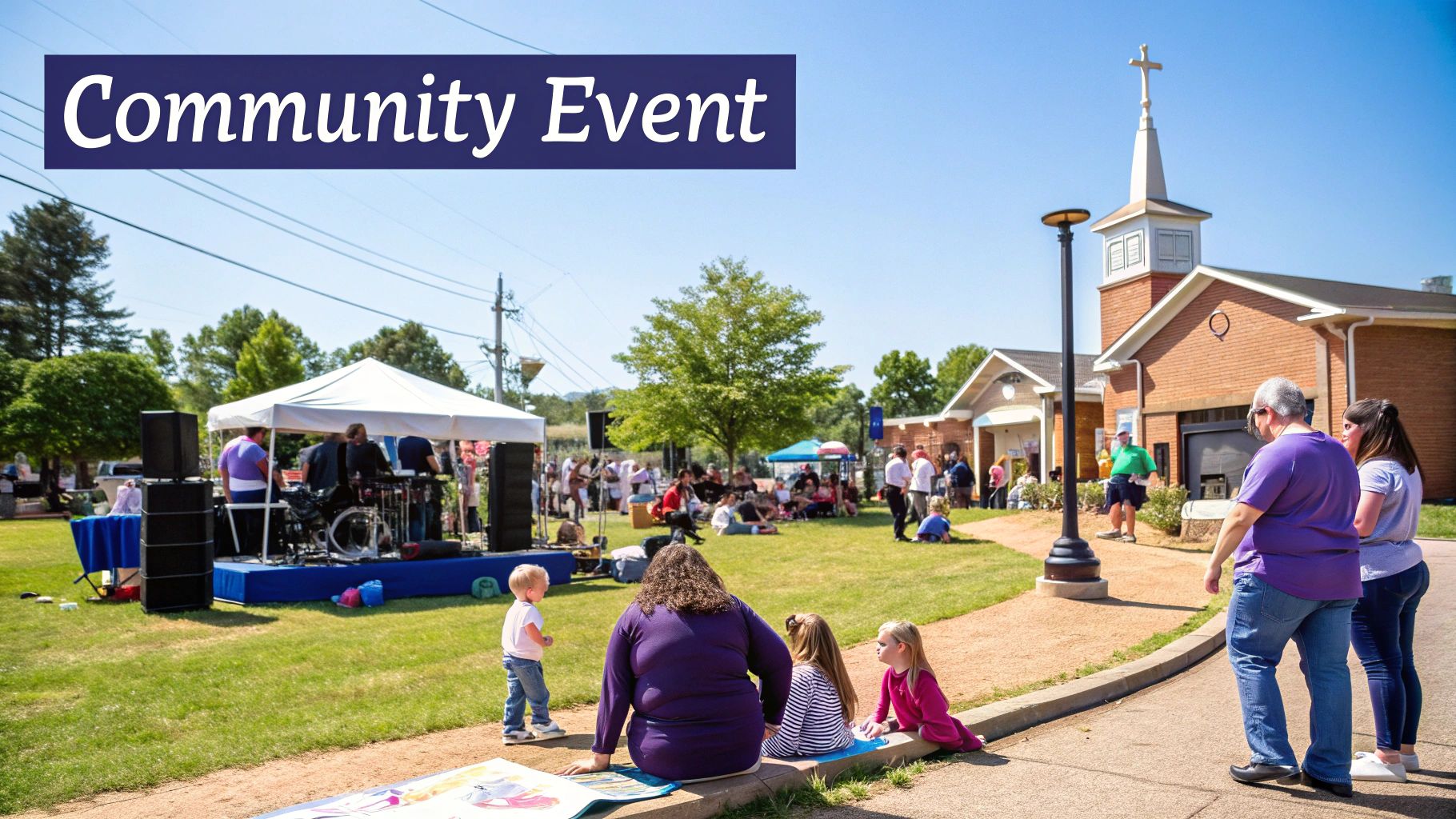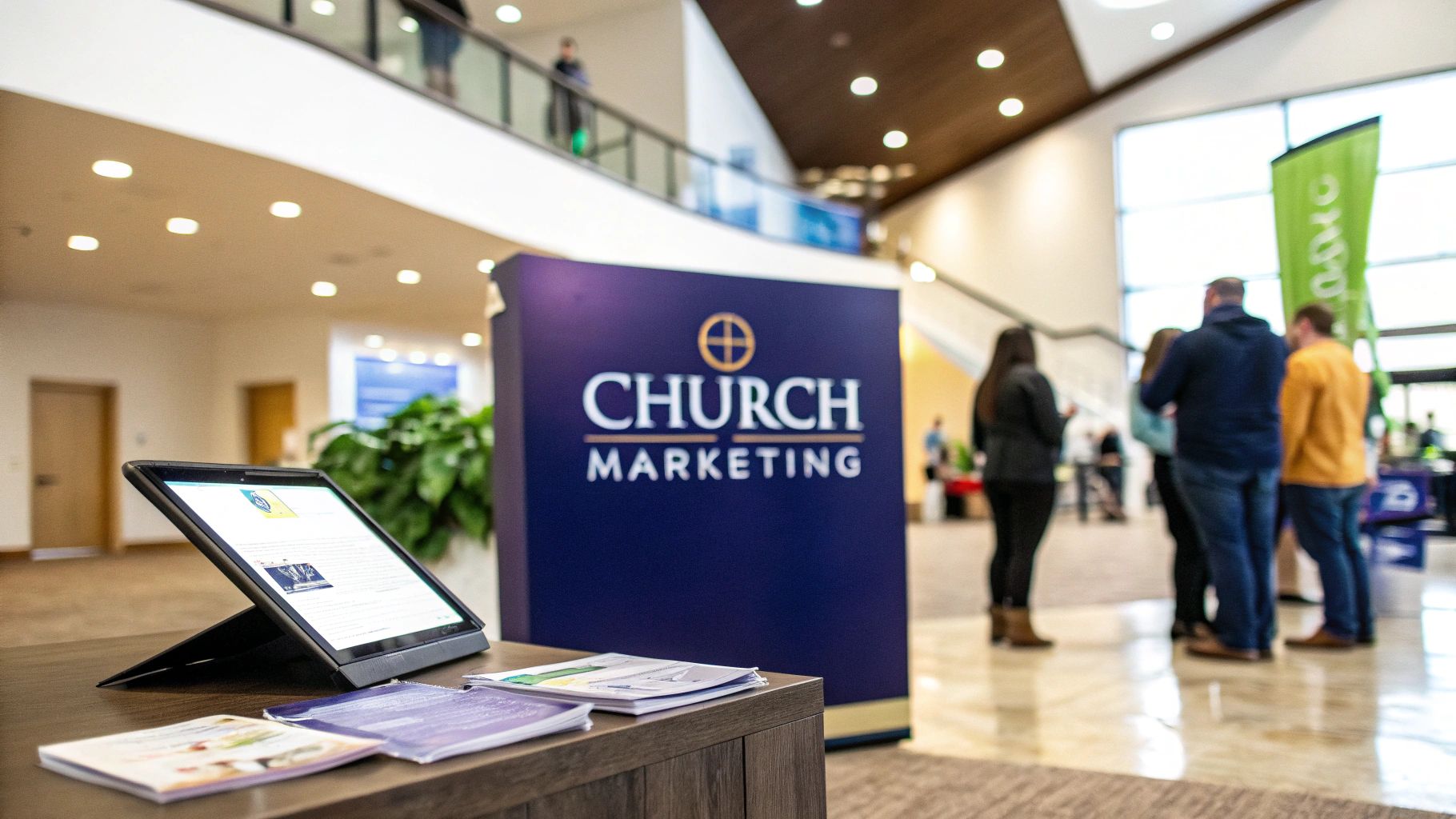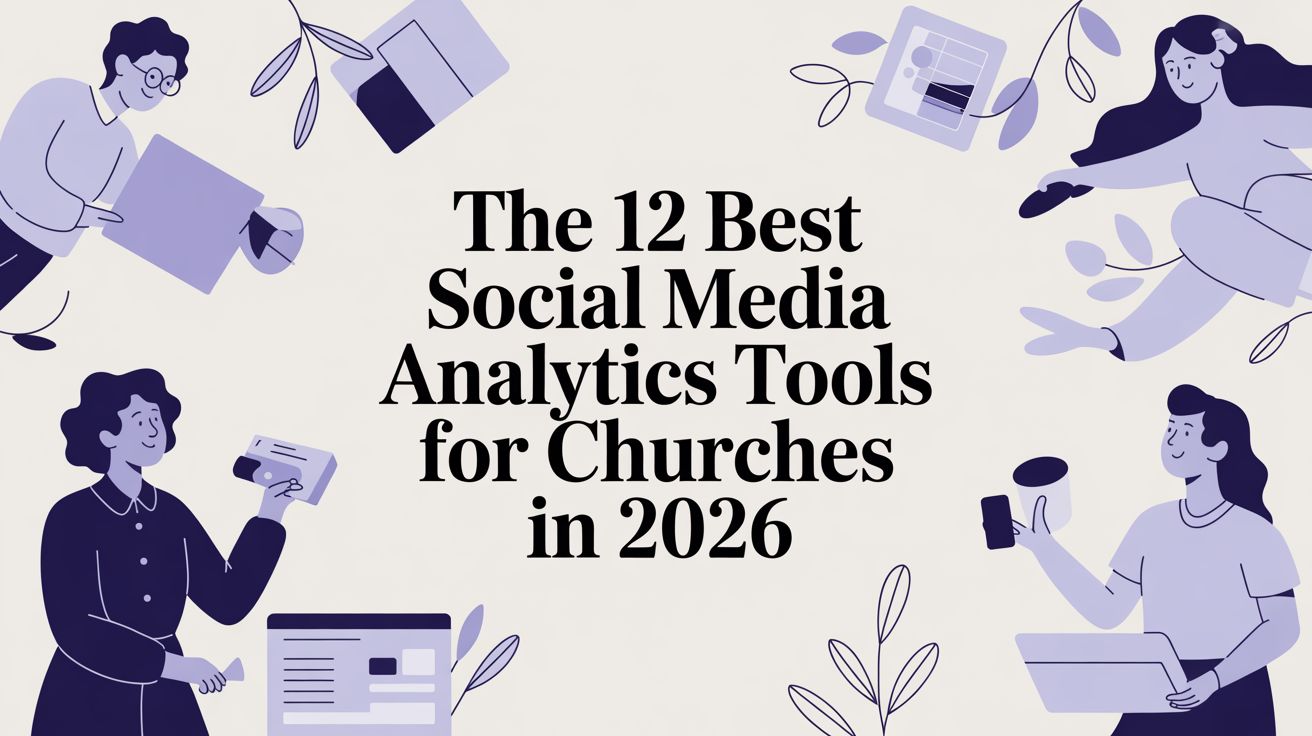In an increasingly connected world, sharing your church's message and building a vibrant community requires more than just opening your doors on Sunday. It demands a thoughtful approach to connection and communication. Effective marketing strategies for churches are not about adopting corporate sales tactics; they are about extending your ministry’s reach to meet people exactly where they are. This guide moves beyond theory to deliver seven proven, actionable strategies that blend timeless principles of fellowship with powerful modern tools.
You will learn how to connect with both your current congregation and those still searching for a spiritual home. We'll explore practical methods like creating AI-generated sermon clips for social media, fostering authentic community events, and telling powerful stories that resonate online. Consider this your roadmap to amplifying your impact, complete with specific tools and techniques to help you grow your ministry.
Managing these efforts can feel overwhelming, which is why platforms like ChurchSocial.ai are invaluable. They streamline the process by helping you create sermon-based content, design graphics, and manage your entire social media calendar from one place, allowing you to focus more on ministry and less on management. Let's dive into the strategies that will help you expand your welcome.
1. Embrace Digital Evangelism Across Social Platforms
In today's connected world, a church's ministry extends far beyond its physical walls. Digital Evangelism is about creating a vibrant, 24/7 online presence where your message of hope and community can thrive. This involves a strategic approach to platforms like Facebook, Instagram, and YouTube, transforming them from simple announcement boards into dynamic spaces for worship, connection, and outreach.
The goal is to build an engaged online congregation that complements and expands your in-person fellowship. Effective digital evangelism reaches people in your local community and across the globe who may never step through your physical doors. It’s a crucial component of modern marketing strategies for churches, meeting people exactly where they are: on their phones and computers.
Actionable Steps for Implementation
Creating a consistent and authentic online presence can feel overwhelming for busy church staff and volunteers. The key is to leverage your core content, the sermon, and repurpose it strategically.
- Transform Sermons into Shareable Content: Your weekly sermon is a goldmine of content. Instead of just posting the full-length video, extract powerful quotes, key scriptures, or impactful stories. Turn these into visually appealing graphics, short video clips (Reels/Shorts), or thought-provoking text posts.
- Foster Interactive Engagement: Don't just broadcast; build a community. Ask questions in your captions, run polls in your Stories about sermon topics, and respond to every comment. Go live for a brief Q&A with your pastor after the service to discuss the message more personally.
- Streamline Your Workflow: The challenge is not a lack of content but a lack of time. This is where dedicated tools become essential.
Pro-Tip: Platforms like ChurchSocial.ai are designed to solve this exact problem. You can upload a sermon transcript and use AI to automatically generate social posts, blog articles, and even short video reels. This turns one sermon into a week's worth of engaging content, saving countless hours. By integrating with your church calendar, it also helps create timely posts for all your events, ensuring your digital presence is both inspirational and informative.
2. Community-Centric Event Marketing
Effective church marketing goes beyond inviting people to Sunday services; it involves becoming an integral part of the community's fabric. Community-Centric Event Marketing is a strategy focused on creating and promoting events that serve the genuine needs and interests of the broader local area, not just your congregation. This positions your church as a valuable, active, and caring community resource.
The goal is to host events like neighborhood block parties, free family movie nights, or practical workshops that attract people who might not otherwise engage with a church. By meeting a tangible need or providing a point of connection, you build goodwill and create natural opportunities for relationship. This approach is one of the most powerful marketing strategies for churches looking to build bridges and demonstrate their mission in a practical, hands-on way.

Actionable Steps for Implementation
Hosting a successful community event requires more than just opening your doors; it demands strategic planning and promotion to ensure you reach the right people and make a lasting impact.
- Identify and Meet a Real Need: Don't just guess what your community wants. Survey local residents, talk to school leaders, or partner with city officials to identify genuine needs. This could lead to a job-skills workshop, a back-to-school supply drive, or a free community health fair.
- Partner with Local Businesses: Increase your reach and resources by partnering with local businesses for sponsorships or cross-promotion. A local coffee shop might provide beverages for your event in exchange for being featured in your marketing materials.
- Train Volunteers for Welcome, Not Pressure: Equip your volunteer team to be warm and welcoming hosts. Their role is to build relationships and make guests feel comfortable, not to deliver a hard pitch. Teach them how to naturally answer questions about the church if asked.
Pro-Tip: Managing and promoting events can be complex, but the right tools can simplify the process. ChurchSocial.ai integrates with your church calendar (like Planning Center) to automatically generate promotional social media posts for your events. You can use its drag-and-drop calendar to schedule a full promotional campaign, ensuring your community knows about the valuable resources you're offering. This streamlined workflow frees you up to focus on creating an excellent event experience.
3. Storytelling and Testimony-Based Marketing
Facts and figures can inform, but personal stories are what truly connect and inspire. Storytelling and testimony-based marketing leverages authentic accounts of transformation from your congregation to show, not just tell, the impact of your ministry. This approach moves beyond abstract concepts and demonstrates the real-world power of faith and community in a deeply personal and relatable way.

The goal is to build an emotional bridge with potential visitors, helping them see themselves in the stories of others. When someone seeking hope hears a story of redemption from a member of your church, it creates a powerful invitation. This is one of the most effective marketing strategies for churches because it is rooted in authenticity and human connection.
Actionable Steps for Implementation
Capturing and sharing these powerful stories requires a thoughtful and organized approach. The key is to make it easy for members to share and for your team to produce high-quality content that honors their vulnerability.
- Systemize Story Collection: Create a simple online form or a designated email address where members can submit their stories. Actively invite testimonies during services or in small groups. Having a system ensures you always have a pool of powerful stories ready to be shared.
- Focus on High-Quality Production: Invest in good audio and lighting for video testimonials. A shaky, poorly lit video can distract from a powerful message. The story itself is paramount, but quality production signals that you value and honor the testimony being shared.
- Repurpose Every Story: A single 5-minute video testimony is a content goldmine. Transcribe the video to create a blog post, pull out impactful quotes for social media graphics, and create short audio clips for a podcast. Using a sermon transcription service can be a great way to handle this for video stories, just as you would for a sermon.
Pro-Tip: Make storytelling a central part of your content plan with ChurchSocial.ai. You can upload a recorded testimony, and the AI can help generate a blog post draft, social media captions, and even suggest powerful quotes. Use the graphic templates to create visually compelling quote cards and schedule everything on the content calendar to ensure a steady stream of inspirational, testimony-based content for your community.
4. Influencer and Partnership Evangelism
In an age of connection, the most powerful endorsements often come from a trusted voice. Influencer and Partnership Evangelism is a strategic approach that leverages the credibility and reach of respected figures and organizations to share your church’s message. This strategy moves beyond traditional advertising by building authentic relationships with local business leaders, community influencers, and other ministries to expand your reach and build trust within the community.

The core principle is that people are more likely to attend a service or event when invited by someone they already know and respect. From large-scale collaborations with Christian music artists to local partnerships with a neighborhood coffee shop, this method taps into existing networks of trust. It’s a key component of modern marketing strategies for churches, demonstrating that your ministry is an active, valued part of the wider community.
Actionable Steps for Implementation
Building effective partnerships requires intentionality and a clear vision for mutual benefit. The goal is to create authentic connections that serve both your church and your partners, extending your ministry's impact.
- Identify and Vet Potential Partners: Look for local leaders, non-profits, or businesses whose values align with your church's mission. Thoroughly vet potential partners to ensure the collaboration will be authentic and honor your ministry's core beliefs.
- Create Mutually Beneficial Arrangements: A true partnership is a two-way street. Offer to promote a local business's community event in your bulletin or on social media in exchange for them displaying your flyers. Co-host a community service day with another non-profit to combine resources and reach.
- Leverage Cross-Promotion on Social Media: When you partner with an organization or individual, actively cross-promote on social media. Tag them in your posts, share their relevant content, and ask them to do the same. This simple action exposes your church to a new, engaged audience.
Pro-Tip: Managing the content for these partnerships can be demanding. Use a tool like ChurchSocial.ai to streamline the process. You can schedule collaborative posts in its drag-and-drop calendar, ensuring timely promotion for joint events. Use its AI-powered tools to create graphics and captions that highlight your partners, and easily coordinate your entire partnership marketing plan from one central hub, saving valuable time for relationship-building.
5. Content Marketing and Educational Outreach
Beyond Sunday sermons, your church holds a wealth of wisdom that can address the real-world challenges people face. Content marketing is the strategy of creating and sharing valuable, relevant resources-such as blogs, podcasts, and video series-to attract and engage a clearly defined audience. This positions your church not just as a place of worship, but as a trusted source of guidance for spiritual growth, parenting, marriage, and personal finance.
The goal is to provide genuine value to your community, answering the questions they are already asking online. By offering practical, faith-based solutions to everyday problems, you build credibility and establish a relationship with individuals long before they consider visiting. This is one of the most effective long-term marketing strategies for churches, as it nurtures a connection based on trust and service.
Actionable Steps for Implementation
Creating a robust content library may seem daunting, but it's an extension of the teaching ministry you already perform. The key is to organize your expertise into formats that are easy for people to find and consume.
- Address Felt Needs with Content Series: Instead of one-off posts, develop a series around a central theme your community is searching for, like "Navigating Anxiety with Faith" or "Building a Stronger Marriage." This could become a multi-week blog series, a podcast season, or a collection of short educational videos.
- Repurpose Sermons into Deeper Resources: Your sermon is the perfect starting point. Expand on a key point from Sunday's message in a detailed blog post, create a downloadable discussion guide for small groups, or host a live webinar Q&A with the pastor to dive deeper into the topic.
- Optimize for Search and Discovery: Use keyword research to understand the exact phrases people use when searching for answers online. Incorporate these keywords into your blog titles, podcast descriptions, and video tags to ensure your valuable content appears in search results.
Pro-Tip: Managing a content strategy requires significant planning and creation time. ChurchSocial.ai simplifies this process by transforming a single sermon transcript into a multitude of content pieces. Its AI can generate blog post outlines, discussion questions, and even scripts for short educational videos, turning one core message into a comprehensive content series. This allows you to build a rich resource library efficiently, establishing your church as an authoritative and helpful voice in your community.
6. Referral and Invite Campaign Systems
While digital outreach is powerful, the single most effective marketing tool a church possesses is its own congregation. A Referral and Invite Campaign System formalizes the process of personal invitation, turning organic word-of-mouth into a structured and intentional growth strategy. This approach recognizes that an invitation from a trusted friend is far more likely to be accepted than any digital ad.
The goal is to equip and empower your members to become enthusiastic ambassadors for your church. Instead of just hoping they invite people, you create a supportive framework with clear on-ramps, easy-to-use tools, and specific events designed for guests. This is one of the most authentic marketing strategies for churches, as it is built on genuine relationships and personal testimony.
Actionable Steps for Implementation
Creating a culture of invitation requires more than just an occasional announcement from the pulpit. It involves providing practical tools and building momentum through organized campaigns.
- Equip Members with Invitation Tools: Don't leave it to chance. Provide a mix of physical and digital resources. Design high-quality, pocket-sized invite cards for upcoming sermon series or special events. Create shareable digital graphics and pre-written text messages that members can easily send to their friends and family.
- Host "Bring a Friend" Events: Design specific services or events with first-time guests in mind. These could be special "Friend Day" Sundays, community BBQs, or holiday services. The key is to make the environment exceptionally welcoming and the message accessible to someone unfamiliar with your church.
- Systematize the Follow-Up Process: A visitor’s first experience is crucial. Have a clear, simple process for connecting with every guest. Collect contact information through a straightforward connect card (physical or digital) and ensure they receive a personal follow-up, like a text message or email from the pastor, within 24-48 hours.
Pro-Tip: Coordinating these campaigns requires seamless communication. With ChurchSocial.ai, you can manage the entire process from a central hub. Schedule a series of social media posts promoting your "Invite Sunday," use graphic templates and an editor to design visuals for members to share, and leverage calendar integrations to keep everyone informed. This ensures your internal promotion is as strong as your external outreach.
7. Local SEO and Google My Business Optimization
When someone in your community searches "churches near me" or "local Bible study," your church needs to be the first name they see. Local Search Engine Optimization (SEO) is the technical strategy that makes your church highly visible in local search results, on Google Maps, and in voice searches. It’s about ensuring your digital front door is wide open and easy to find for people actively seeking a spiritual home.
The goal is to connect with individuals and families in your immediate geographical area at their moment of need. An optimized online presence ensures that when someone is looking for hope, community, or answers, your church is a prominent and accessible option. This is one of the most powerful marketing strategies for churches because it targets people with high intent, making them more likely to visit your website and, ultimately, your services.
Actionable Steps for Implementation
Optimizing for local search is a process of providing clear, consistent, and comprehensive information about your church to search engines like Google. This signals that you are a relevant and trustworthy result for local queries.
- Claim and Master Your Google Business Profile: Your Google Business Profile (formerly Google My Business) is your church's digital billboard. Fill out every section completely: add high-quality photos, list all service times, specify your denomination, and answer questions in the Q&A section. This is the single most important factor for local search visibility.
- Cultivate and Respond to Reviews: Encourage your congregation to leave positive reviews on Google. Consistently receiving new reviews signals to Google that your church is active and valued. Make sure to respond to all reviews, both positive and negative, to show you are engaged with your community.
- Ensure Information Consistency: Your church's Name, Address, and Phone number (NAP) must be identical across your website, Google Business Profile, Facebook page, and any other online directories. Inconsistencies can confuse search engines and hurt your local ranking.
Pro-Tip: Integrating your local SEO efforts with your content strategy is key. Platforms like ChurchSocial.ai can help create location-specific blog posts from your sermons, discussing community events or local outreach. This not only provides valuable content for your audience but also builds local relevance for search engines. By tying your inspirational content to your physical location, you strengthen your digital roots in the community you serve.
7-Strategy Marketing Comparison for Churches
Integrating Your Strategies for Sustainable Growth
We've explored a powerful collection of marketing strategies for churches, from leveraging digital evangelism on social media to optimizing your local SEO for discoverability. Each approach offers a unique pathway to connect with your community, share your message, and invite people into a transformative journey of faith. However, their true power is not found in isolation but in integration.
Think of these strategies as interconnected gears in a larger engine of ministry. Your community-centric events (Strategy 2) create powerful moments and stories. These stories and testimonies (Strategy 3) then become compelling, authentic content for your social media ministry (Strategy 1) and your content marketing efforts (Strategy 5). A well-run invite campaign (Strategy 6) becomes more effective when it's easy for newcomers to find you through your optimized Google My Business profile (Strategy 7). This synergy transforms sporadic efforts into a sustainable, holistic outreach ecosystem.
From Strategy to Execution: The Path Forward
The primary takeaway is this: consistency is more important than complexity. It's better to master one or two of these strategies and execute them well than to attempt all seven with limited resources and see minimal results. The real challenge for most church leaders and volunteers isn’t a lack of ideas but a lack of time and streamlined processes to bring those ideas to life.
Here are your actionable next steps:
- Assess and Prioritize: Review the seven strategies and identify one or two that align best with your church's current strengths and community needs. Don't try to boil the ocean.
- Create a Simple Plan: Define what success looks like for your chosen strategy. Is it more event attendees? Increased website traffic? More first-time visitors? Set a tangible goal for the next 90 days.
- Empower with the Right Tools: The biggest obstacle to consistency is often the friction of manual, time-consuming tasks. The day-to-day management of creating graphics, writing captions, scheduling posts, and analyzing what works can be overwhelming.
This is precisely where the right technology can serve your ministry. By automating and simplifying the execution, you free up your team to focus on what truly matters: building relationships and sharing the Gospel. As you drive more traffic to your website, remember to analyze how people engage once they arrive. To truly measure the success of your modern marketing, focusing on strategies for improving website conversion rates can help turn visitors into active participants in your church community.
Ultimately, mastering these modern marketing strategies for churches is about more than just filling seats. It's about being faithful stewards of the message you've been given, meeting people where they are, and building a thriving spiritual home that impacts lives. By integrating these tactics with intentionality and the support of smart tools, you can build a bridge from your church's heart to the heart of your community, fostering connection and creating a legacy of sustainable growth.
Ready to turn your church’s powerful sermons and events into engaging social media content without the extra work? ChurchSocial.ai uses AI to generate reels, posts, and graphics from your sermon transcripts and calendar events, all managed through a simple drag-and-drop calendar. Start streamlining your church's marketing today at ChurchSocial.ai and focus more on your ministry, not your marketing tasks.




